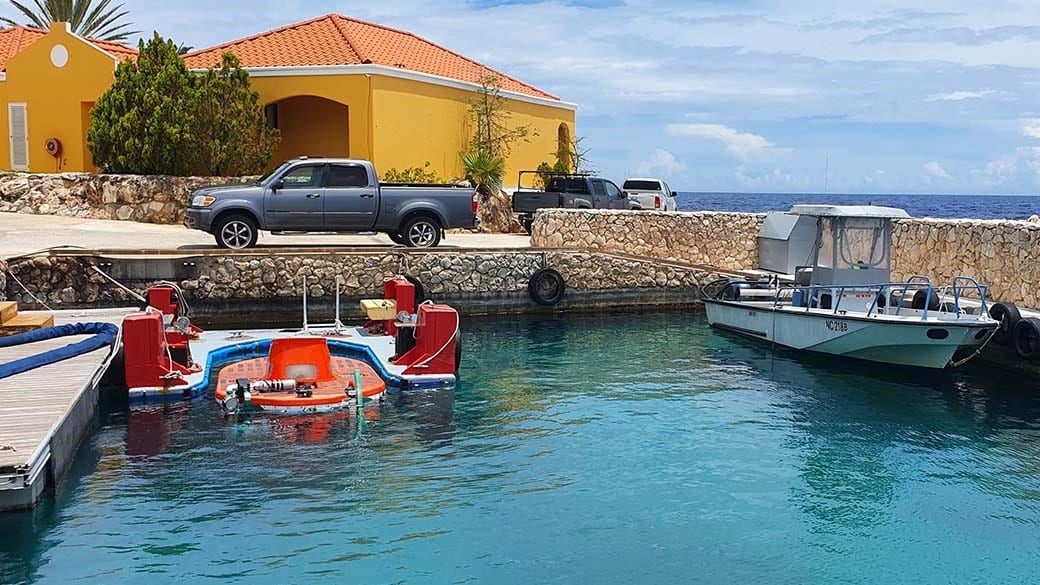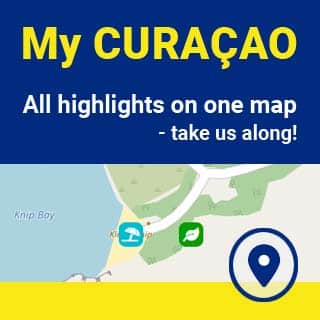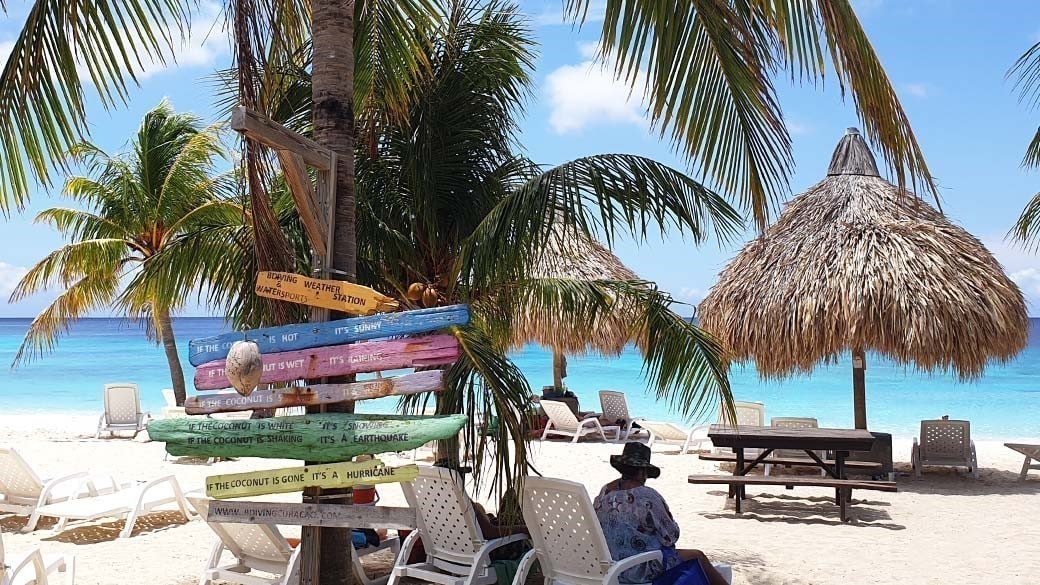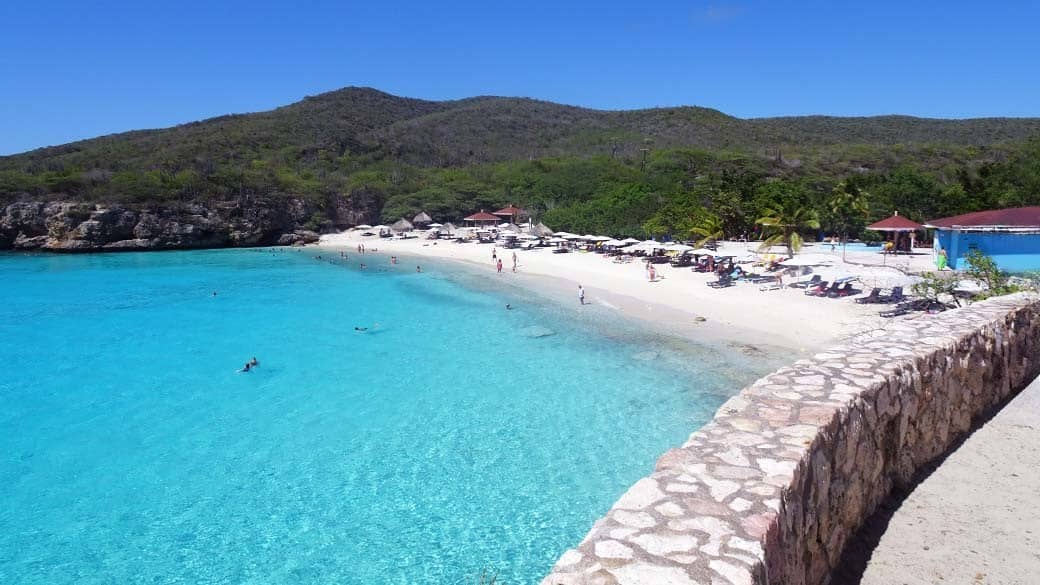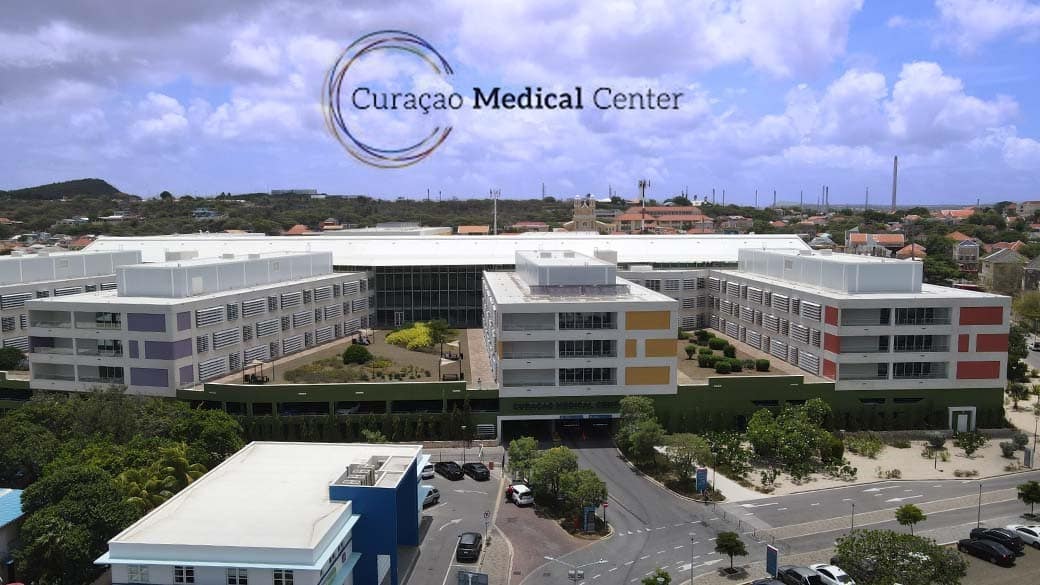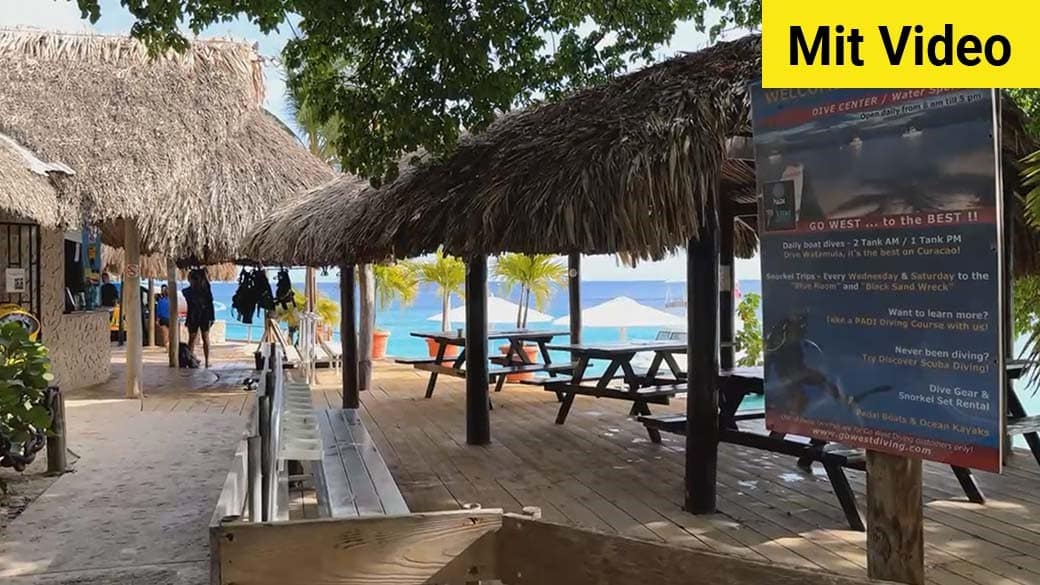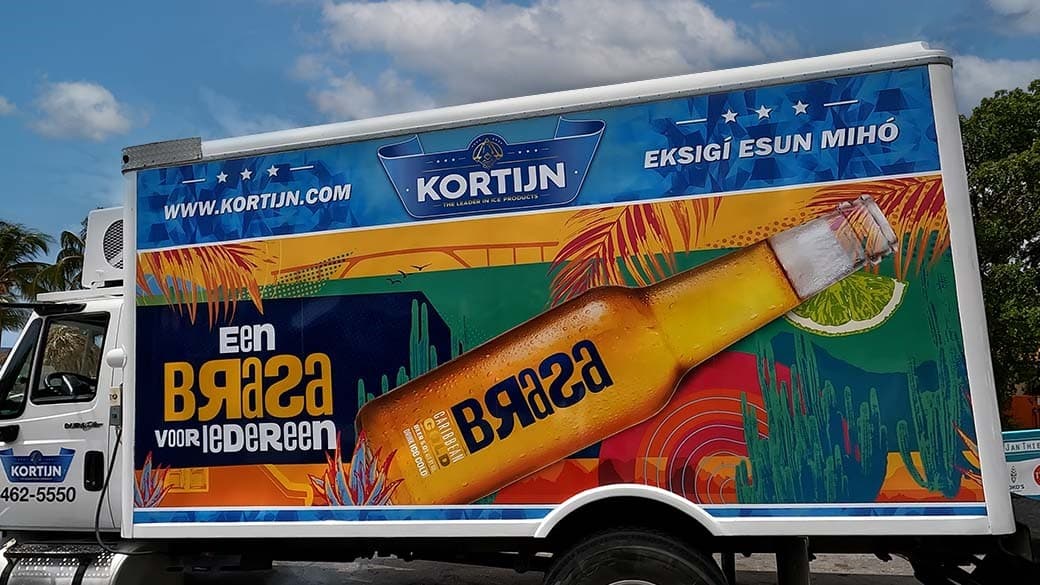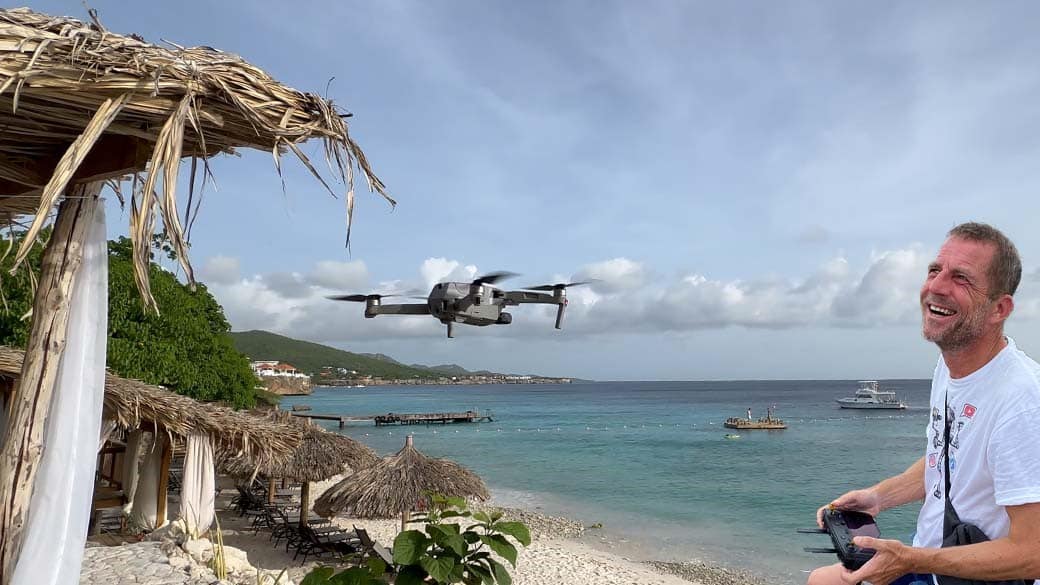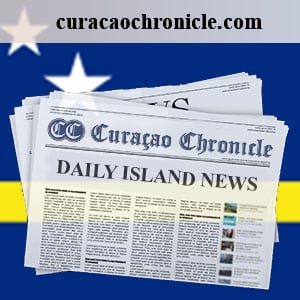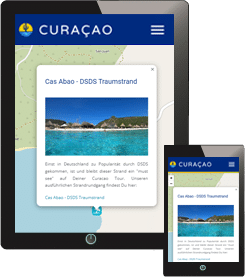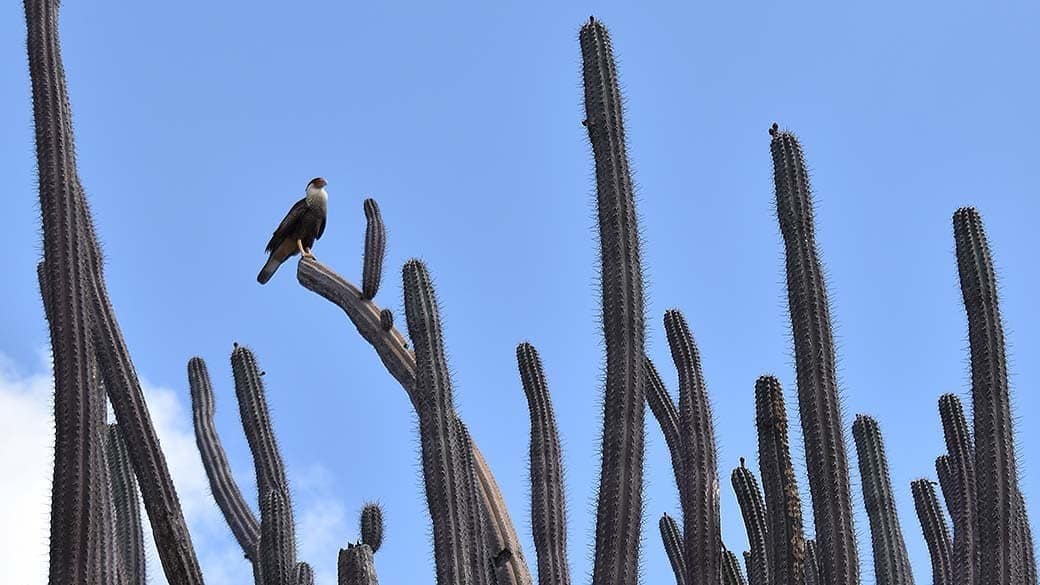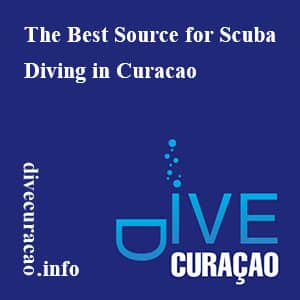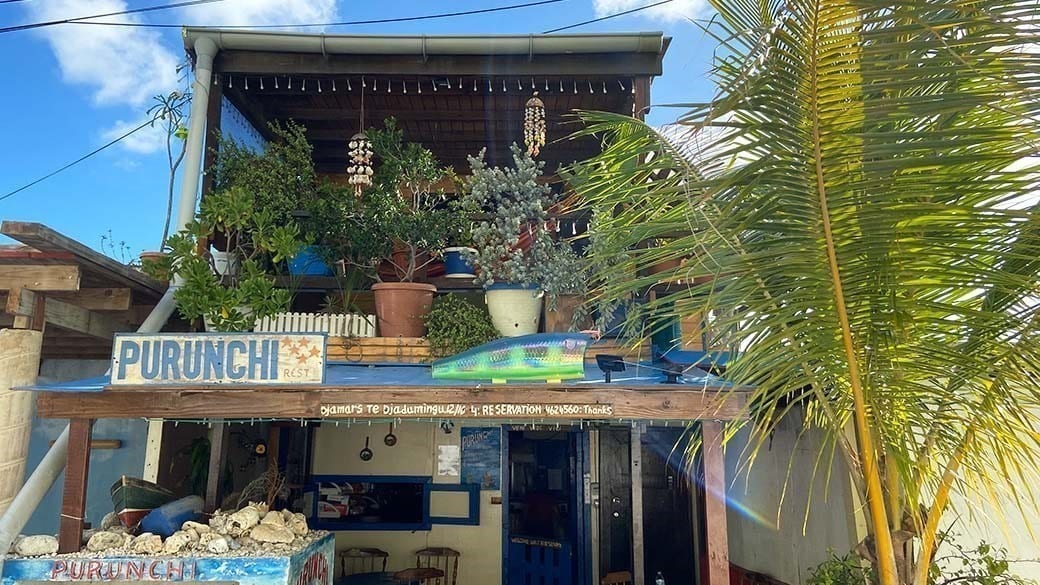Into the depths by Substation submarine
A once-in-a-lifetime event in Curacao
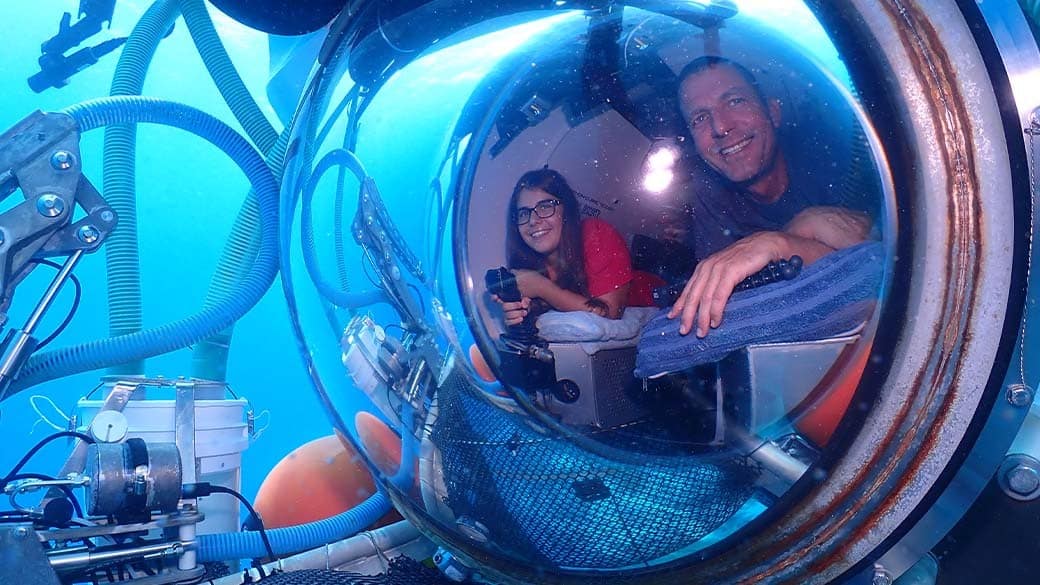
Have you ever dreamed of diving with a submarine and exploring the wonders of the deep sea? If so, then the rush you'll get with Substation Curacao is just what you need!
Sea Aquarium, Dolphin Academy and Substation
Just a stone's throw from Mambo Beach, you will find a hidden gem in the south-east of the island. A small bridge leads to a small island world. Here you'll find a real treasure trove for dolphin and underwater enthusiasts. While you can marvel at sharks and other marine life up close in the Curacao Sea Aquarium, you can also swim with dolphins in their natural habitat or admire the colorful underwater life at a depth of about 15 meters (Curacao Ocean Lens). This already is an absolutely unforgettable day trip for the whole family.
Just a few meters further on, things really get exciting! At the outermost tip of the small island (called Bapor Kibrá), you'll find one of the most spectacular attractions in the Caribbean: the deep-sea research submarine Curasub. Their office and staring point for the offered underwater experiences can be found in a small yellow house – Curacao😉 Once built for purely scientific purposes and used in numerous missions far beyond Curacao, the submarine can now be booked by tourists as an adrenaline rush!

Yellow office of Substation Curacao
How one gift became two
This unique experience was supposed to be a gift for our daughter Paula, as her long-awaited exchange to the USA could not take place due to the Covid-19 pandemic. As she has been interested in marine biology for years (and is now studying biology), it seemed like an expensive but appropriate compensation.
So we went into the aforementioned yellow house. We were greeted with a friendly welcome right away and were even offered something to drink. In the best of moods and after a detailed consultation, we decided on the "big package". After all, something like this is and remains a "once in a lifetime" event.
After an introduction to the Curasub project and a comprehensive safety briefing, the moment when we were finally due to set off drew ever closer. And then, out of the blue, Tico (our amazing instructor) told us that it would probably be boring for Paula alone underwater. As we were the only ones interested during the pandemic (and generally some of the few guests on the island), we were given a really great offer for a second place, which we couldn't refuse.

Briefing by Substation Curacao
So, which of us was going to get to take the free spot? Maike wasn't too keen on the idea, and our older daughter didn't have her glasses with her, so she wouldn't have been able to see anything. Well, what can I say? I was lucky!
Permanent radio contact
Safety first! Throughout the dive, safety is monitored by constant radio contact with the team on shore. 100% redundancy in the battery supply, as well as the air and oxygen supply, plus air scrubbers in the cabin to remove carbon dioxide (CO2), means the submarine can stay safely underwater for up to 96 hours.
The pressure thing
As the scuba divers among you know, the ambient pressure rises by 1 bar for every 10 meters you descend. This means that enormous forces are acting on the submarine, but don't worry! You don't notice any of this. There is no pressure equalization. There is constant atmospheric pressure inside, so you can breathe normally and it feels exactly the same as on the surface. And there's no creaking, like in the famous Hollywood blockbusters. The opposite is true, though! It's really, really quiet. You can hear the drive from time to time, but that's it.

Painted Styrofoam cups that are taken underwater
As you can see from the photos, we had been given a painting task before the start of our adventure. We were supposed to paint polystyrene drinking cups, which we took on the journey in a net attached to the outside of the submarine. You can imagine what happened to the cups at a depth of 250 meters, can't you? Keyword: shot glass ;-
And the light was gone
For the first few minutes, we drove along the reef and were absolutely blown away by the beautiful Caribbean underwater world. The thick and large glass dome made this an incredible experience. It was also incredible because the glass acts like a magnifying glass and makes everything appear much bigger than it actually is.

Paula and Stefan look at the diver from inside the submarine
We didn't even notice that we were continuously descending deeper and deeper into the blue sea. The natural sunlight was so bright that it illuminated the underwater world for too long. But suddenly the colors faded and the water became darker and darker. At this moment, Tico briefly switched off the submarine's headlights. And it became dark – really dark: black! That was the first moment when at least I thought, "Oops!"
Journey to nowhere
Ok, I had no idea where we were or how deep we were. Compass and depth gauge, which we as divers always have with us: no chance. So we went further down and for the first time we registered the depth gauge in the submarine itself: 500 feet, 800 feet, 850 feet. Exciting!

Depth indicator shows 821 feet in the Substation Curacao submarine
The underwater world was no longer colorful and through the spotlight Tico showed us creatures we had never seen before. There were still some fish, but they were rare. It was an entirely different world.
A note at this point: Tico kept us informed throughout the dive. Not too much and never intrusive. But not too little either, so we were always aware of what we were seeing. And he was constantly communicating with the ground station to give us our location. It was all very pleasant and professional.
Garbage collector
Unfortunately, we humans "gift" the ocean with tons of garbage every day. Especially microplastics are a big problem. This will be the subject of a separate article, as we were already part of a "beach cleaning" session.
We were very excited when Tico suddenly said to us under the water that we were going to bring the garbage that we had just seen to the surface. We watched as our guide used the research submarine's grappling arms to skillfully collect the garbage into the basket on the bow.

The Substation Curacao submarine in the shipyard
Dolphins ahead
Shortly before we left, dolphins were spotted along our route. We kept a constant lookout for these fascinating and intelligent animals. Unfortunately, the school of dolphins did not do us the honor and we returned without a dolphin or shark sighting. This would have been the icing on the cake of an extremely interesting and entertaining submarine excursion.
Instead, we visited a wreck on the way up and spent a long time looking at the corals, sponges, fish and the hustle and bustle around the wreck. So we had an "all inclusive" package with "Wreck Dive", "Explorer Dive" and "Research Dive" (see below). Thank you Tico!!! It was unique, wonderful and you as a team gave us an unforgettable moment.
Dive packages
There are three different packages that differ in dive time, maximum depth and of course price:
- Wreck Dive: 450ft / 135m, 1 hour, $450 per person
- Explorer Dive: 650ft / 200m, 1.5 hours, $650 per person
- Research dive: 1000ft. / 300m, 2 hours, $1000 per person
Individual tours are also available. Full photo documentation (at the base, by a diver on the dive, and in the submarine itself) and first class all-round support are included in all packages.

Paula and Stefan on the submarine of Substation Curacao
Once in a lifetime
Yes, it is very expensive and we thought long and hard about whether we should spend all that money. We did not regret it! The experience and memories are worth every penny. In other places in the world, you will be charged well over EUR 100 for an elevator ride to the top of a skyscraper. Many people go up, but few people in the world have ever been that far underwater.
Would you spend that kind of money for the experience of a lifetime? We'd love to know – let us know in the comments.
Sustainability
I don't want to end this article without mentioning that both Substation Curacao and the Curacao Sea Aquarium with its "Swim with the Dolphins" offer focus on animal welfare and the environment. On Curacao you can swim with the dolphins because you can be sure that they could "run away" into the open sea at any time. They don't, because they are happy and enjoy working with their trainers. You can also dive up to 300 meters underwater and know that this is a crew that cares about species and the environment. Garbage is even collected during tourist excursions. Curacao is very concerned about protecting its own reefs and marine life.

Coral deep under water (approx. 200m)
Our partner Bryan Horne
We have already introduced Bryan in an interview as the ideal partner for your dive trip to Curacao. We got to know him in 2017 when he showed us around the sub station and explained the submarine to us. Bryan has spent many years on scientific expeditions in the Caribbean and beyond. He is your perfect partner when it comes to "underwater" in the Caribbean. Talk to him and find out more on his website.
Do you know the answer? We collected 100+ entertaining questions about Curacao. Have fun!
Quiz Question
How do I find a pharmacy in Curacao?Answer
A pharmacy is called Botica or Botika on Curacao.
Look out for this name on houses and shops and not Farmacia or Pharmacy. The snake from the staff of Aesculapius is often the symbol.
The boticas are very well stocked on Curacao. You can get many medicines there even without a doctor’s prescription. Boticas are also drugstores and often have products that you know from home, some of which are cheaper than in the supermarkets.
Do you like more? Here is another post you might be interested in:
If you enjoyed this article, we would be very happy if you share it with your friends on social media. Thank you very much!
Enough of being under water? How about a little relaxation on the snow-white beaches of Curacao? Or a few tips for a trip? Feel free to browse our lifestyle, shopping or nature sections. In the secrets category, we'll tell you what you may not yet know about the heart of the Caribbean.
Into the depths by Substation submarine
A once-in-a-lifetime event in Curacao

Have you ever dreamed of diving with a submarine and exploring the wonders of the deep sea? If so, then the rush you'll get with Substation Curacao is just what you need!
Sea Aquarium, Dolphin Academy and Substation
Just a stone's throw from Mambo Beach, you will find a hidden gem in the south-east of the island. A small bridge leads to a small island world. Here you'll find a real treasure trove for dolphin and underwater enthusiasts. While you can marvel at sharks and other marine life up close in the Curacao Sea Aquarium, you can also swim with dolphins in their natural habitat or admire the colorful underwater life at a depth of about 15 meters (Curacao Ocean Lens). This already is an absolutely unforgettable day trip for the whole family.
Just a few meters further on, things really get exciting! At the outermost tip of the small island (called Bapor Kibrá), you'll find one of the most spectacular attractions in the Caribbean: the deep-sea research submarine Curasub. Their office and staring point for the offered underwater experiences can be found in a small yellow house – Curacao😉 Once built for purely scientific purposes and used in numerous missions far beyond Curacao, the submarine can now be booked by tourists as an adrenaline rush!

Yellow office of Substation Curacao
How one gift became two
This unique experience was supposed to be a gift for our daughter Paula, as her long-awaited exchange to the USA could not take place due to the Covid-19 pandemic. As she has been interested in marine biology for years (and is now studying biology), it seemed like an expensive but appropriate compensation.
So we went into the aforementioned yellow house. We were greeted with a friendly welcome right away and were even offered something to drink. In the best of moods and after a detailed consultation, we decided on the "big package". After all, something like this is and remains a "once in a lifetime" event.
After an introduction to the Curasub project and a comprehensive safety briefing, the moment when we were finally due to set off drew ever closer. And then, out of the blue, Tico (our amazing instructor) told us that it would probably be boring for Paula alone underwater. As we were the only ones interested during the pandemic (and generally some of the few guests on the island), we were given a really great offer for a second place, which we couldn't refuse.

Briefing by Substation Curacao
So, which of us was going to get to take the free spot? Maike wasn't too keen on the idea, and our older daughter didn't have her glasses with her, so she wouldn't have been able to see anything. Well, what can I say? I was lucky!
Permanent radio contact
Safety first! Throughout the dive, safety is monitored by constant radio contact with the team on shore. 100% redundancy in the battery supply, as well as the air and oxygen supply, plus air scrubbers in the cabin to remove carbon dioxide (CO2), means the submarine can stay safely underwater for up to 96 hours.
The pressure thing
As the scuba divers among you know, the ambient pressure rises by 1 bar for every 10 meters you descend. This means that enormous forces are acting on the submarine, but don't worry! You don't notice any of this. There is no pressure equalization. There is constant atmospheric pressure inside, so you can breathe normally and it feels exactly the same as on the surface. And there's no creaking, like in the famous Hollywood blockbusters. The opposite is true, though! It's really, really quiet. You can hear the drive from time to time, but that's it.

Painted Styrofoam cups that are taken underwater
As you can see from the photos, we had been given a painting task before the start of our adventure. We were supposed to paint polystyrene drinking cups, which we took on the journey in a net attached to the outside of the submarine. You can imagine what happened to the cups at a depth of 250 meters, can't you? Keyword: shot glass ;-
And the light was gone
For the first few minutes, we drove along the reef and were absolutely blown away by the beautiful Caribbean underwater world. The thick and large glass dome made this an incredible experience. It was also incredible because the glass acts like a magnifying glass and makes everything appear much bigger than it actually is.

Paula and Stefan look at the diver from inside the submarine
We didn't even notice that we were continuously descending deeper and deeper into the blue sea. The natural sunlight was so bright that it illuminated the underwater world for too long. But suddenly the colors faded and the water became darker and darker. At this moment, Tico briefly switched off the submarine's headlights. And it became dark – really dark: black! That was the first moment when at least I thought, "Oops!"
Journey to nowhere
Ok, I had no idea where we were or how deep we were. Compass and depth gauge, which we as divers always have with us: no chance. So we went further down and for the first time we registered the depth gauge in the submarine itself: 500 feet, 800 feet, 850 feet. Exciting!

Depth indicator shows 821 feet in the Substation Curacao submarine
The underwater world was no longer colorful and through the spotlight Tico showed us creatures we had never seen before. There were still some fish, but they were rare. It was an entirely different world.
A note at this point: Tico kept us informed throughout the dive. Not too much and never intrusive. But not too little either, so we were always aware of what we were seeing. And he was constantly communicating with the ground station to give us our location. It was all very pleasant and professional.
Garbage collector
Unfortunately, we humans "gift" the ocean with tons of garbage every day. Especially microplastics are a big problem. This will be the subject of a separate article, as we were already part of a "beach cleaning" session.
We were very excited when Tico suddenly said to us under the water that we were going to bring the garbage that we had just seen to the surface. We watched as our guide used the research submarine's grappling arms to skillfully collect the garbage into the basket on the bow.

The Substation Curacao submarine in the shipyard
Dolphins ahead
Shortly before we left, dolphins were spotted along our route. We kept a constant lookout for these fascinating and intelligent animals. Unfortunately, the school of dolphins did not do us the honor and we returned without a dolphin or shark sighting. This would have been the icing on the cake of an extremely interesting and entertaining submarine excursion.
Instead, we visited a wreck on the way up and spent a long time looking at the corals, sponges, fish and the hustle and bustle around the wreck. So we had an "all inclusive" package with "Wreck Dive", "Explorer Dive" and "Research Dive" (see below). Thank you Tico!!! It was unique, wonderful and you as a team gave us an unforgettable moment.
Dive packages
There are three different packages that differ in dive time, maximum depth and of course price:
- Wreck Dive: 450ft / 135m, 1 hour, $450 per person
- Explorer Dive: 650ft / 200m, 1.5 hours, $650 per person
- Research dive: 1000ft. / 300m, 2 hours, $1000 per person
Individual tours are also available. Full photo documentation (at the base, by a diver on the dive, and in the submarine itself) and first class all-round support are included in all packages.

Paula and Stefan on the submarine of Substation Curacao
Once in a lifetime
Yes, it is very expensive and we thought long and hard about whether we should spend all that money. We did not regret it! The experience and memories are worth every penny. In other places in the world, you will be charged well over EUR 100 for an elevator ride to the top of a skyscraper. Many people go up, but few people in the world have ever been that far underwater.
Would you spend that kind of money for the experience of a lifetime? We'd love to know – let us know in the comments.
Sustainability
I don't want to end this article without mentioning that both Substation Curacao and the Curacao Sea Aquarium with its "Swim with the Dolphins" offer focus on animal welfare and the environment. On Curacao you can swim with the dolphins because you can be sure that they could "run away" into the open sea at any time. They don't, because they are happy and enjoy working with their trainers. You can also dive up to 300 meters underwater and know that this is a crew that cares about species and the environment. Garbage is even collected during tourist excursions. Curacao is very concerned about protecting its own reefs and marine life.

Coral deep under water (approx. 200m)
Our partner Bryan Horne
We have already introduced Bryan in an interview as the ideal partner for your dive trip to Curacao. We got to know him in 2017 when he showed us around the sub station and explained the submarine to us. Bryan has spent many years on scientific expeditions in the Caribbean and beyond. He is your perfect partner when it comes to "underwater" in the Caribbean. Talk to him and find out more on his website.
Recommended articles you might be interested in:
Curacao is alive and things are always changing. What has changed since our last visit? How is your experience? Would you please share your personal experiences with us? Feel free to write your comment under this article and follow us on our social media channels. There you can spontaneously share your personal impressions with us and our community - "sharing is caring". We look forward to your contribution and every new follower!
Leave A Comment
Quiz Question
How do I find a pharmacy in Curacao?Answer
A pharmacy is called Botica or Botika on Curacao.
Look out for this name on houses and shops and not Farmacia or Pharmacy. The snake from the staff of Aesculapius is often the symbol.
The boticas are very well stocked on Curacao. You can get many medicines there even without a doctor’s prescription. Boticas are also drugstores and often have products that you know from home, some of which are cheaper than in the supermarkets.
#withus - our articles at your fingertips on a common map - try it!




